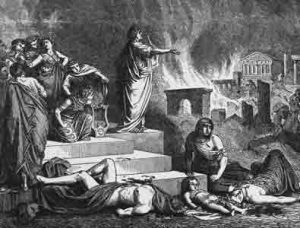 There are a large number of people waiting for a full-spectrum, apocalyptic crash of the Western system. What I maintain is that it won’t happen. And I hope to convince you that I’m right.
There are a large number of people waiting for a full-spectrum, apocalyptic crash of the Western system. What I maintain is that it won’t happen. And I hope to convince you that I’m right.
The risk of this moment is a long, steady decline in quality of life, not an apocalypse.
Not that an apocalypse doesn’t have great dramatic appeal, of course…
During the apocalypse, all things degenerate fall, all secrets are exposed, the truth is no longer hidden, and we’re proven right in the end. Like I say, it’s a fine dramatic movie plot, but it won’t happen that way in the modern world.
None of this is to say that the present status quo will remain, because it won’t. Like mighty Pharaoh and Eternal Rome, it will pass into history, mourned for a season at best.
Reasons And Proofs
The reasons we won’t have a full-spectrum crash (beyond active war zones) are simply that…
-
- There are far too many productive people.
-
- There is far too much literature on how to do everything from digging holes to manufacturing trucks to tailoring space suits.
-
- There are far too many fully developed systems and processes, ready to be operated by anyone with will.
-
- We have multiple and redundant communication systems: Mail, email, messengers (car and bike) text messages, several phone networks, ham radio, CB radio, pager networks and more.
-
- We have an incredibly widespread belief that all the things we need are possible. More than that, we know that they’ve been supplied, for multiple decades, by regular people: by our friends, family and neighbors. We have no doubt that anything we need can be rebuilt.
If I pulled out a map and drew a thirty mile arc around my childhood home, that area would contain literally millions of people who collectively knew how to do almost anything and everything that needs to be done: making refrigerators, running electrical generators, stringing power lines, winding transformers, refining oil, mixing metal alloys, fabricating everything from steel to Styrofoam, growing crops, building silos, and so on, ad infinitum.
I’m not saying that nothing bad will ever happen, but I am saying this, emphatically:
Once things go bad, we’ll know precisely how to make them good again.
Now, let’s go to some real-world proof. And we can begin with the Covid disaster: Huge swaths of the world’s economic activity were simply stopped. This held across entire continents, and in fact over all inhabited continents. I’m not sure precisely how may of the world’s producers were held under house arrest, but it was billions for sure.
As I say, entire continents were shut down, in a moment. Churches, schools, parks, a huge number of businesses, and much more. That matches the level of many apocalypse scenarios. And yet…
And yet all we got were shortages and inflation. I’m not a fan of either, of course, but the post-Covid years could hardly qualify as a Mad Max wasteland.
So, I’ll call that a first proof, and I think a solid one. But I’ll follow it with another. Here’s a passage from Stephan Zeig’s The World of Yesterday. In it, he describes his life in Austria and Germany in the aftermath of World War I, with it’s wild currency breakdown:
The will for life to go on proved stronger than the instability of the currency. In the midst of financial chaos, daily life went on almost the same…. Regardless of individual fates, the flywheel of the mechanism kept on turning in the same old rhythm. Nothing stood still. The baker made bread, the cobbler made shoes, the writer wrote books, the farmer cultivated the land, the trains ran regularly, the newspaper lay outside your door every morning at the usual time, and the places of entertainment in particular, the bars and the theaters, were full to overflowing. For with the daily loss in the value of money, once the most stable aspect of life, people came to appreciate true value, such as work, love friendship, art and nature all the more, and in the midst of disaster the nation as a whole lived more intensely than ever before, strung to a higher pitch.
Bear in mind that this account comes to us from an intelligent and observant man who lived through it. In it we see that people do adapt and find ways to get the things they need. And to this account we can add that we’re a century advanced from it, and we know a lot more of how to accomplish things.
The last serious argument for apocalypse I see involves humans being so degraded that they are unable to stir themselves from their couches and act on their own initiative. That’s a very bad scenario, of course, but I don’t believe it will happen.
Every generation sees the one following as a disaster; I have have quotes on that going back to 1750 BC. If it were true, we’d have devolved into lower lifeforms by now.
And beyond that, there’s a self-correction mechanism built into humans: it’s called hunger. So, if things get so bad that there are actual food shortages, motivation will explode and edicts will be completely ignored.
So…
I hope I have convinced you to look beyond the apocalypse drama and to see that reality will not be so stark. If enough people comply with their overlords horrible things can happen, but there is not a “back to the stone ages” apocalypse in our future.
**
Paul Rosenberg
freemansperspective.com
